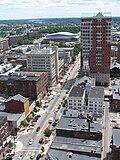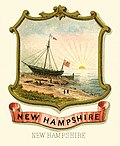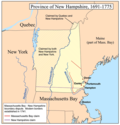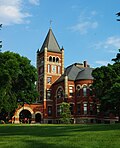Judith McNaught
The New Hampshire Portal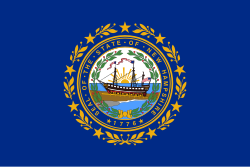 New Hampshire (/ˈhæmpʃər/ HAMP-shər) is a state in the New England region of the Northeastern United States. It borders Massachusetts to the south, Vermont to the west, Maine and the Gulf of Maine to the east, and the Canadian province of Quebec to the north. Of the 50 U.S. states, New Hampshire is the seventh-smallest by land area and the tenth-least populous, with a population of 1,377,529 residents as of the 2020 census. Concord is the state capital and Manchester is the most populous city. New Hampshire's motto, "Live Free or Die", reflects its role in the American Revolutionary War; its nickname, "The Granite State", refers to its extensive granite formations and quarries. It is well known nationwide for holding the first primary (after the Iowa caucus) in the U.S. presidential election cycle, and for its resulting influence on American electoral politics. New Hampshire was inhabited for thousands of years by Algonquian-speaking peoples such as the Abenaki. Europeans arrived in the early 17th century, with the English establishing some of the earliest non-indigenous settlements. The Province of New Hampshire was established in 1629, named after the English county of Hampshire. Following mounting tensions between the British colonies and the crown during the 1760s, New Hampshire saw one of the earliest overt acts of rebellion, with the seizing of Fort William and Mary from the British in 1774. In January 1776, it became the first of the British North American colonies to establish an independent government and state constitution; six months later, it signed the United States Declaration of Independence and contributed troops, ships, and supplies in the war against Britain. In June 1788, it was the ninth state to ratify the U.S. Constitution, bringing that document into effect. Through the mid-19th century, New Hampshire was an active center of abolitionism, and fielded close to 32,000 Union soldiers during the U.S. Civil War. After the war, the state saw rapid industrialization and population growth, becoming a center of textile manufacturing, shoemaking, and papermaking; the Amoskeag Manufacturing Company in Manchester was at one time the largest cotton textile plant in the world. The Merrimack and Connecticut rivers were lined with industrial mills, most of which employed workers from Canada and Europe; French Canadians formed the most significant influx of immigrants, and today roughly a quarter of all New Hampshire residents have French American ancestry, a statistic second only to Maine among states. Reflecting a nationwide trend, New Hampshire's industrial sector declined after World War II. Since 1950, its economy has diversified to include financial and professional services, real estate, education, transportation and high-tech, with manufacturing still higher than the national average. Beginning in the 1950s, its population surged as major highways connected it to Greater Boston and led to more commuter towns. New Hampshire is among the wealthiest and most-educated states. It is one of nine states without an income tax and has no taxes on sales, capital gains, or inheritance while relying heavily on local property taxes to fund education; consequently, its state tax burden is among the lowest in the country. New Hampshire is one of the least religious states and known for its libertarian-leaning political culture; it was until recently a swing state in presidential elections and is still of the least liberal states in New England. The New Hampshire Republican Party has held a trifecta majority in state level government since 2017, with the exception of 2019 and 2020, while the Democratic Party has held a majority on New Hampshire's federal level representation in Congress. New Hampshire is the only state to have a woman as governor and women as both U.S. senators. (Full article...) Entries here consist of Good and Featured articles, which meet a core set of high editorial standards.
The Amos Tuck School of Business Administration at Dartmouth College is the graduate business school of Dartmouth College, a private Ivy League research university in Hanover, New Hampshire. The school offers only a Master of Business Administration degree program. Founded in 1900, the Tuck School was the first institution in the world to offer a master's degree in business administration, and is the second oldest Ivy League business school. (Full article...) Selected article -Manchester is the most populous city in the U.S. state of New Hampshire. As of the 2020 census, it had a population of 115,644. Manchester is the tenth-most populous city in New England. Manchester is, along with the city of Nashua, one of two seats of New Hampshire's most populous county, Hillsborough County. Manchester lies near the northern end of the Northeast megalopolis and straddles the banks of the Merrimack River. It was first named by the merchant and inventor Samuel Blodget(t), eponym of Samuel Blodget Park and Blodget Street in the city's North End. His vision was to create a great industrial center similar to that of the original Manchester in England, which was the world's first industrialized city. (Full article...) General images -The following are images from various New Hampshire-related articles on Wikipedia.
Did you know -
TopicsCategoriesNew articlesThis list was generated from these rules. Questions and feedback are always welcome! The search is being run daily with the most recent ~14 days of results. Note: Some articles may not be relevant to this project.
Rules | Match log | Results page (for watching) | Last updated: 2025-05-02 22:41 (UTC) Note: The list display can now be customized by each user. See List display personalization for details.
Related portalsWikiProjectsAssociated WikimediaThe following Wikimedia Foundation sister projects provide more on this subject:
Sources |

 Read
Read
 AUTHORPÆDIA is hosted by Authorpædia Foundation, Inc. a U.S. non-profit organization.
AUTHORPÆDIA is hosted by Authorpædia Foundation, Inc. a U.S. non-profit organization.












